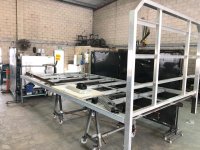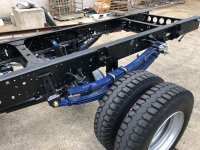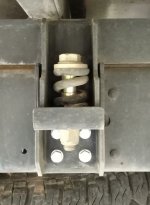Our subframe, to which the tray is mounted, is fully floating; that is, it isn't fixed.
This is our tray part way through construction, it is welded to the subframe rails. If you look carefully, you can see the two rails which will sit atop the chassis rails that are welded to the tray frame.

These are our chassis rails with two of the spring mount holders bolted to the passenger side chassis rail with four bolts for each mount, you can see the opposite tops of the spring mount holders on the drivers side chassis rail. Note that they are proud of the chassis rail. The space is taken up with a soft almost non compressing material, so you don't get a metal on metal chafing arrangement. Note the ATW parabolic springs, super single wheels and tyres were fitted later.

This is one of the spring mounts, the bolt is 140mm long, to give you an idea.

Assembly of the tray onto the chassis rails.

This is our under the tray water tank, custom made plastic tank enveloped inside a stainless steel outer to protect it from rocks, and what have you. Holds 140 litres, gravity fed and gravity drained, no pumps or whatever to break down. This tank is well clear of the chassis rails and the fore and aft crossover sections of the chassis, thereby allowing the chassis to twist to it's hearts content.
You can also see the gaps in between the parabolic springs in the background, parabolic springs are able to work independently without friction from other leaf springs, supposedly giving a better ride.
Whatever people think about parabolic springs compared to standard leaf spring arrangements, every single person driving a standard leaf spring arrangement on their NPS truck when they are in our truck, are very impressed with our suspension comfort factor, compared to theirs.

Mick.







